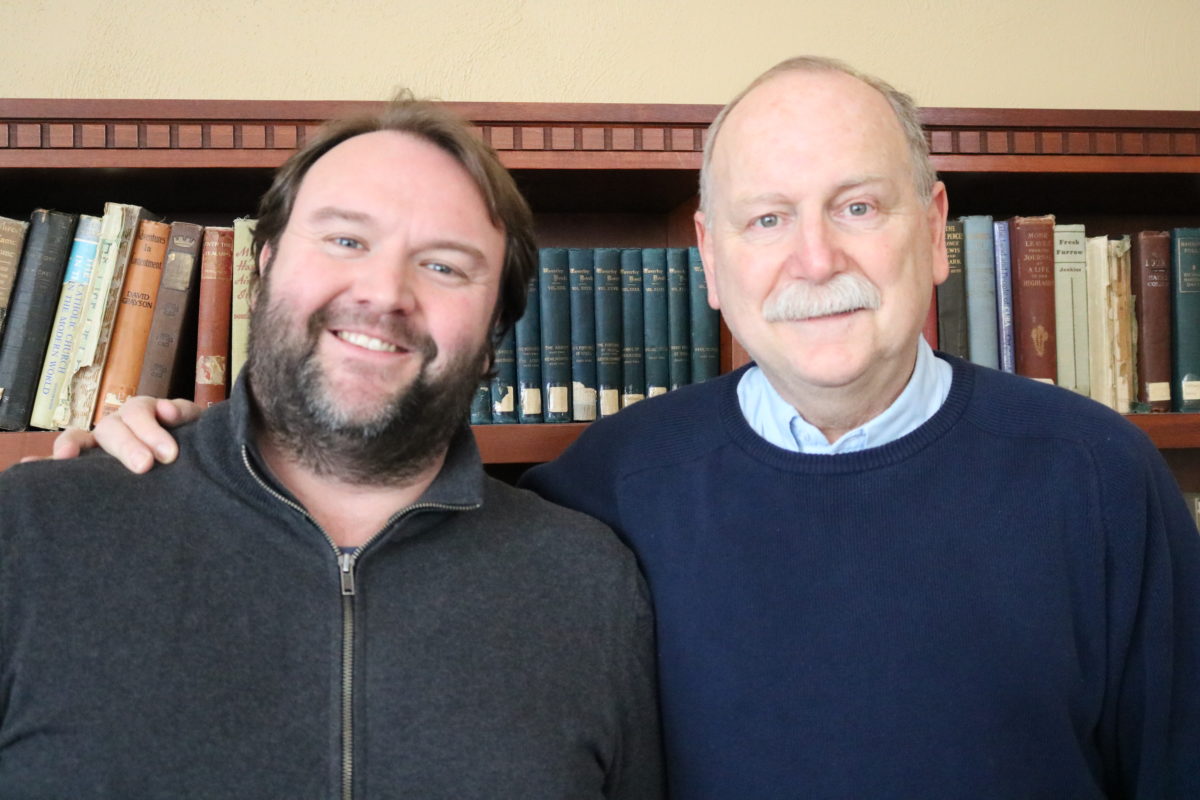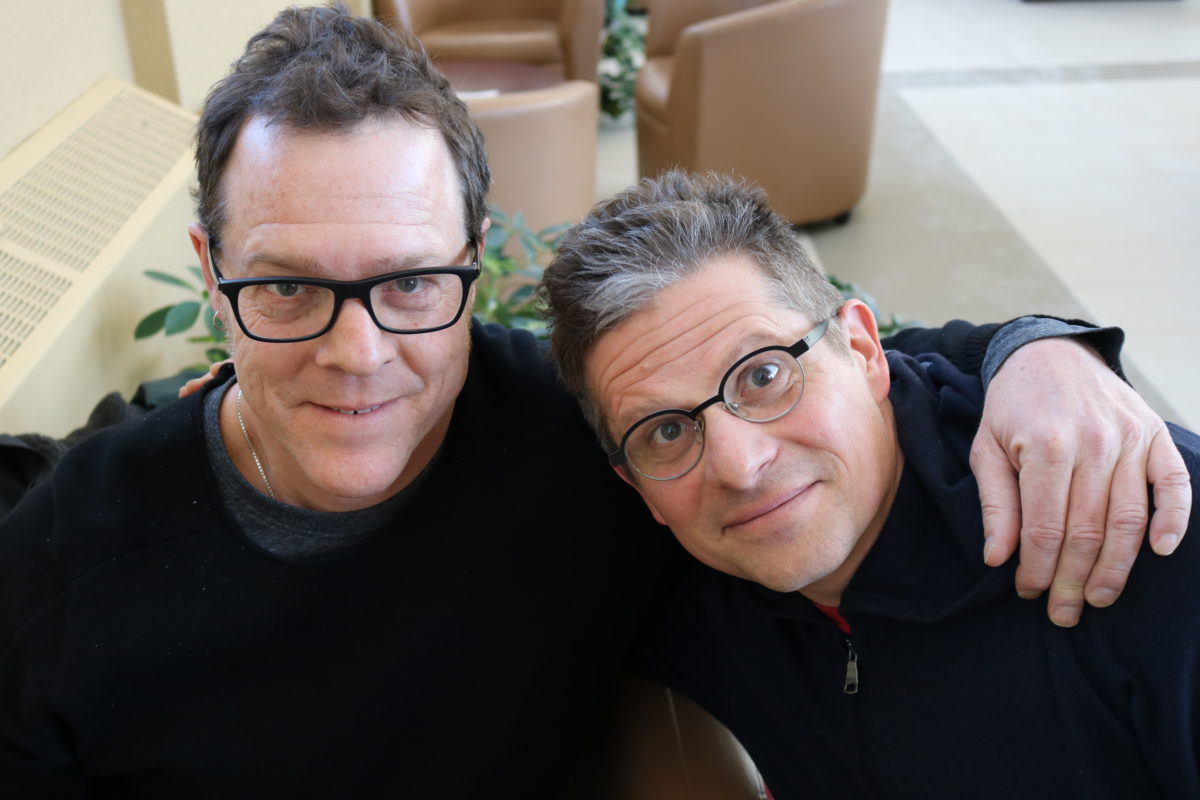At a school with no more than 2,000 students, professors of St. Thomas University are bound to rely on one another, and that sometimes means team-teaching courses.
Philip Lee of STU’s journalism and communications department first met Great Books’ Alan Hall 10 years ago, when they were scheduled to teach an Aquinas course together.
They began planning the course in August, so they decided to meet at Hall’s house, along with former professor Rick Myers, who would also be teaching the course.
Although they knew some of the same people and had a connection through their alma maters, Hall’s first impression of Lee came from his style.
“I [remember] Phil came and he was wearing these sunglasses that were really cool,” he said.
That first experience led to years of team-teaching together which has benefitted them both greatly.
“It was one of my first experiences team-teaching and … I know that I improved my teaching and it’s a completely different kind of experience in a sense that you’re collaborating and you’re also learning at the same time,” Lee said.
Hall explained the reason he enjoys team-teaching is because it gives professors the opportunity to continue to learn, whether it’s from other professors or the students.
“We don’t get into [teaching] because we want to be an expert … what draws us in, is that we love being in class, learning, reading, we just kind of get it and we love it,” he said.
When asked about why team-teaching works for them, Hall said, “I think we like each other.”
Lee said he admires how Hall teaches the students.
“I think that we have similar tastes. The things that Alan thinks are beautiful, I tend to think are beautiful as well.”
Team-teaching involves opening up classrooms to more than one perspective, but it also means you really get to know someone though those perspectives.
“Most of the teaching I do now is team-teaching,” Hall said. “It’s wonderful, and there’s a lot of reasons for that. The personal one is that you end up in these friendships that develop over teaching which is kind of an amazing feeling.”
Those friendships often lead to trust and a shared sense of purpose.
“I don’t have any fear that he wants to out-do me or show me up,” Hall said.
“And there’s no fear of failure,” Lee said. “[Team-teaching] allows you to try some things that are outside your comfort zone. And I wouldn’t have been able to do that without knowing that I had some backup and support there.”
Over the years, there have been students who have taken team-taught courses with Hall and Lee, and Hall remembers his favourite memory of Lee was when he fought for a student who deserved a better grade.
“Phil really went to bat for her. He was like, ‘We need to give her a better grade, because she worked so hard and she is going to be really good at this,’ and he was totally right, and it wouldn’t have been what I chose to do. That moment of generosity and this care about the students … I often think of that,” he said.
Jamie Gillies, a communications and public policy professor at STU was hired by Patrick Malcolmson of the political science department in 2010. Now, the pair uses their different backgrounds to team-teach students varying perspectives on American government and politics.

“Malcolmson said in jest during the first class, ‘I’m government, he’s politics,’ and in certain sense, based on our academic expertise, that’s correct,” Gillies said in an email.
“So team-teaching … is great because students get two different ways of understanding the themes of the course with two different teaching styles and two different perspectives.”
Both professors have a strong interest in politics, which is why they and their colleagues meet once a month at a restaurant to discuss current events.
“The last two election cycles in the [United States] and Canada have made for some lively discussion,” Gillies said.
He admits the group doesn’t always agree on everything. However, Malcolmson can attest to the idea that disagreements only create a better understanding between the professors.
“Perhaps more than anything else, we agree that honorable and intelligent people often disagree, because the issues, especially in politics, are complex,” Malcolmson said.
Although they both have a passion for politics which may lead to some disagreements, there is something they’ll always agree on: football.
“We do have a shared love of the NFL and Malcolmson has an encyclopedic knowledge of the New England Patriots, so we do tend to shift from politics to sports and back again in our discussions,” Gillies said.
Journalism professor Don Dickson remembers the first time he met Pat Richard, the resident tech guy for STU’s journalism program. Although they’ve been working together since 2006 in the basement of CBC teaching students the ins-and-outs of journalism, they first met in 1999 when Richard became a casual at CBC, where Dickson was a reporter.
When asked about his first impression of Dickson, Richard said, “He was too damn tall.” However, a height difference didn’t stand in their way of becoming not only coworkers but friends as well.
In 2004, the pair became a field team for CBC.
“Once we started going out into the field together, that’s basically a social thing. You get to know people when you go on a road trip together,” said Richard.
Two years later, they began working in the basement of CBC teaching journalism students.
“We had our planning session down at the [Lunar Rogue Pub],” said Richard. They still enjoy going to the pub together.


Because of the heavy dependency on equipment in the journalism program, Richard was hired to help Dickson with the technical aspect. However, over the years he became more than just the tech guy.
“Pat knew his stuff and he had lots of experience,” Dickson said. “And my first impression was how much he liked to work with the kids. He was always available. I was impressed by his willingness to pitch in.”
Although they have different jobs, that doesn’t mean they’re opposed to learning new things.
“I like the way [Don] likes to learn things and that’s the whole thing about journalism,” Richard said. “Don’s my oldest student.”
However, every relationship has its bumps in the road.
“We still have our mild little disagreements in class, about particular shots or style of shooting or something like that,” Richard said. “But I think we both respect each other’s point of view and play off that well.”
Richard and Dickson have been working closely together for 14 years and according to Dickson, it’s been fun and easy the whole time.
“You get to know each other. You kind of cooperate and help each other and you have a few laughs, and you have lunch together, and coffee together,” he said.
“And it’s nice to have that extra person just in case you’re going to be five minutes late,” said Richard.

